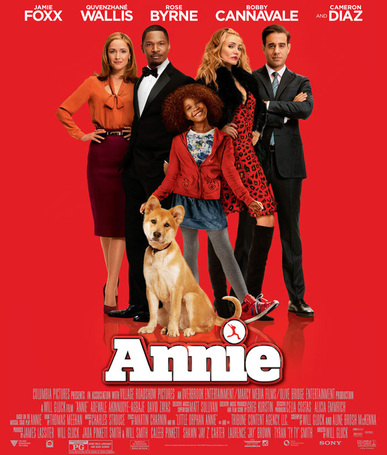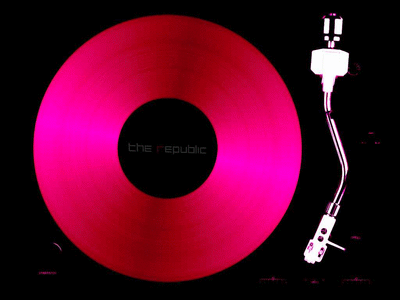 Official movie poster
Official movie poster I finally saw it! Don’t side-eye me too hard.
For 3 years, actor-couple Will and Jada Pinkett-Smith worked to get a film redux of the Broadway adaption of Annie off the ground, starring their only daughter, Willow. The concept of a modern version with a racial-minority in the lead was an exciting prospect. As time passed, there were reports and speculation of this and that person being involved but dropping out, including Glee’s Ryan Murphy (who was said to direct; Will Gluck eventually got the job) and Oscar-winner Emma Thompson for screen-writing. Then, the film lost its principal actress, presumably because she aged out, but a little gem named Quvenzhane` Wallis who came out of nowhere and swept Hollywood off its feet with her debut in the critically-acclaimed Beasts of the Southern Wild saved the day and stepped in. Now that the movie was finally released, how did it measure up?
For those curious about what kind of effect a contemporary setting would have on this classic, they can rest assured it wasn’t negative. In fact, new-age symbols and attitude are used in a memorable and entertaining way that help this version stand-out on its own, particularly in the climax. For example, Ms. Hannigan (Cameron Diaz) is forever jaded that she was kicked out of 90’s dance group C+C Music Factory and a few times in the dialogue the characters make fun of how they keep randomly bursting into song. Part of the cool twist in the conclusion is how, thanks to people being over-sharers and listing their location on social media, Annie is successfully rescued from her captors (how she’s kidnapped is quite different). If there is any disappointment about the present-day application, it will be that there is little cultural or historical commentary. Annie is based on the 1920’s comic strip Little Orphan Annie, which attracted adults with its remarks on President Franklin D. Roosevelt’s New Deal and other political complexities. This was carried on into the Broadway play and the original 1982 film. Wallis’ Annie does a book report on Roosevelt and takes a sarcastic shot at economic inequality, but that’s about it. Other notations don’t come through her and are more subtle, such as the out-of-touch Will Stacks (Jamie Foxx’s translation of Daddy Warbucks) running for mayor with ill-motives.
Musical theater fans might be disenchanted along with junkies for Annie historical references, as a few numbers were cut (I thought this was a plus; there is such a thing as too many) and the remaining sounded like deflated *Simon Cowell voice* karaoke recreations. In all fairness to any deficiencies in vocal performance, Foxx and Tony-winner Bobby Cannavale (who portrays Stacks’ campaign manager) were the only cast-members who sing by trade. Between this film being an update, Smith’s past in music and rapper/entrepreneur Jay-Z (who famously sampled “Hard Knock Life” for a song of the same title) being an executive producer and once rumored to be the soundtrack’s musical supervisor, I just knew the music would be invigoratingly hip and fetching, but…no. They played it safe; any percussion was extremely light and almost fearful of being ‘too urban.’ Greg Kurstin and “Chandelier” singer Sia wrote 3 new songs for the movie; the best of these was “Who Am I?,” which connected the arcs of Annie, Stacks and Hannigan. This reminds me…where numbers were cut, character and plot development filled. In the previous edition, you don’t see, among other things, why Daddy Warbucks needs a public relations tune-up, why he’s so influential that he needs to be concerned with that and why he’s invested in Annie (he seems to take a liking to her because his staff tells him to). Gluck (and co-writer Aline Brosh McKenna) answered these types of questions and took time to build relationships, sizably increasing the ‘pull-on-your-heartstrings’ factor. This Annie has a greater bond with her absentee parents, visiting their last known location weekly, hoping she’ll know them by instinct. Backstories are added to give context for character behavior and the romantic interest between Stacks and his assistant Grace (although their connection is still contrived). We even get to watch Ms. Hannigan (whose 1st name has been changed to Colleen) gradually soften, instead of suddenly gain moral fiber and affection for Annie. There’s also more room to get attached to the other children in the story, with discussion about adoption issues and the large orphanage being changed to a foster home with 5 girls. With all these details, it’s odd that the film opens the door for attention to be lost with a slowing pace in the middle.
The endearing amiability is accentuated by the simply terrific Wallis, who delivers with upmost sincerity like an old pro. As she should, she embodies the spirit of both the brand and figure of Annie, a charming a child whose wisdom and adaptability comes from hardships she shouldn’t have endured, but exudes resolute optimism. Wallis was irresistible and too adorable to function. I’m sure Willow Smith would’ve done well, but it’s hard to picture anyone else in Wallis’ space as much as she sold it. Just like seeing Brandy as Cinderella in 1997 eternally inspired me as a black female child, I’m sure Wallis will have the same effect on her generation. As Stacks’ icy disposition warms, the usually stellar Foxx doesn’t catch up and is a little constipated. Diaz fits right into Ms. Hannigan’s shoes, disproving those, like myself, who were unsure if she was the right choice. Damages actress Rose Byrne is rosey as Grace and Cannavale has no trouble bringing the hyper and comedic, but shady, Guy to life.
Annie 2014 may have its pitfalls, but its heart and shining star are golden and it will be a nice addition to your collection of kid’s movies if you have munchkins. Not be all PSA-like, but if you’re thinking about starting a family, please consider adoption. Stereotypes about orphans and/or foster children being naturally problematic are false. They’re no more likely to be rebellious, disobedient or violent than biological children are everyday. Please turn around and go back to for these children left behind.


 RSS Feed
RSS Feed